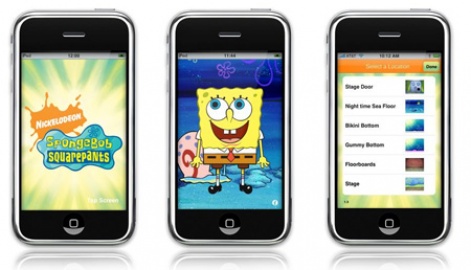US mobile applications firm Mobui has been working with Nickelodeon to bring SpongeBob SquarePants to iPhone, in the form of mini-app The SpongeBob Tickler.
It's been getting more than 3,000 downloads a day since its release in mid-January, and forms part of Nickelodeon's wider push onto the App Store with a range of apps and games.
We grabbed Mobui CEO John Burry to ask about the potential for kids' games on iPhone, and about the interest in the App Store from other big media brands.
Starting with the kids angle: is there a big potential market for iPhone games aimed at children? "We believe this is an area for tremendous growth," he says, citing the strong performance of apps like SpongeBob Tickler and Disney's Fairies Fly!
"With over 3,000 downloads a day at a price of $2-$4 a game, the math clearly shows that there are a lot of parents out there using the iPhone as a learning or entertainment tool for their children. That adds up to a sizeable revenue generating opportunity for children's brands and a new way to reach their audience."

What's driving this growth? Is it parents handing their iPhones over to their kids to keep them quiet occupied, and if so, what kind of apps and games do they feel comfortable passing on in this way?
Burry says research indicates that there's a strong 'handover effect' on iPhone, with parents downloading games and education apps, then handing over their iPhones for them to play with.
"I can tell you that I've seen first hand that these types of applications can be a great distraction for long car rides or trips to the grocery store," says Burry.
"However, it's also worth pointing out that there are a lot of educational applications being built for the iPhone as well that parents are actively using to engage their children and help make learning fun. From flash cards to math games, the iPhone can be quite a powerful learning tool."
What's his hunch about the pricing of these kinds of games and apps? There's downward pressure on prices across the App Store, but is that more or less evident for apps aimed at a younger audience?
Burry stresses that it still depends on the "quality and robustness" of each individual app, and that Mobui lets its brand partners determine prices for their apps.
"We have seen that most parents will easily spend $.99 for a simple game or entertainment application and $2.99 plus for feature-rich applications that have a strong brand awareness," he says.
"When you compare those prices to the cost of many children's toys on the market today, the iPhone applications look quite reasonable."
How interested are these brands in iPhone and the App Store? Unsurprisingly, Burry says their interest is ramping up by the week - Mobui has worked on apps for Nickelodeon, TiVo and VH1 in the last six months alone, with several more consumer and children's brand launches planned for the rest of 2009.
"It may seem like most major children's brands, and media brands in general, are moving slowly to tap into the power of the iPhone to reach new audiences, promote their content, and generate new revenues," he says. "However, I can tell you that this is changing."
He suggests that in 2008, brands were relatively cautious about iPhone and the App Store - "a lot of the brands wanted to see if the business model proved out before they invested a lot of time and money into pursuing it" - but that 500 million app downloads later, they're readly to pile in.
"Judging by the inbound interest we are receiving, there is a real sense of urgency to capitalise on it," he says.
"While most of our customers are viewing their initial iPhone application launches as purely promotional projects, the download numbers they are seeing are indicating that the iPhone can also offer a significant new future revenue stream for them as well."
Many of these media brands have their own interactive content divisions, though. Companies like Disney see producing mobile content (including iPhone apps) as a big part of their interactive media activities going forward.
Do they need a partner like Mobui to help them onto the App Store? Of course, Burry says yes, citing his firm's experienced mobile development team, user experience design skills, speed of delivery and its support of all the major mobile platforms as key selling points.
Judging by its list of clients so far, the pitch is finding favour within those brand-owners.





















